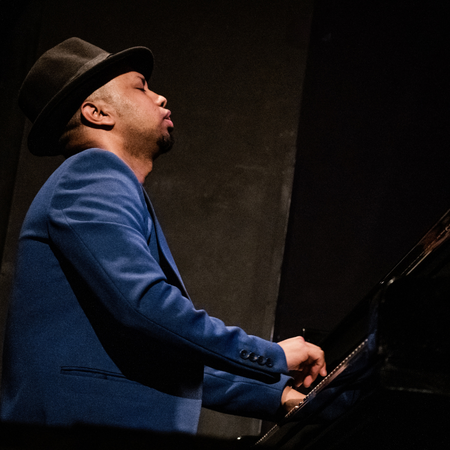Tourdates in Austria :
Tourstart Concert Sept, 22. 2023 at Porgy & Bess Wien!
https://www.kultureninbewegung.org/einzelansicht/samuel-yirga-oesterreich-tour
Flyer
22.09.2023 Wien Porgy & Bess, 20:30
28.09.2023 Salzburg Jazzit, 20:00
30.09.2023 Villach Kulturhof, 20:00
01.10.2023 Innsbruck Treibhaus, 20:30
02.10.2023 Graz Tubes, 20:00
05.10.2023 Kunst & Kultur Raab, 20:30
06.10.2023 St. Johann Muku, 20:00
07.10.2023 Wels Schlachthof, 20:00
„I am open to learn what others have. I want to have an eye on Europe and what is happening there.“ (Samuel Yirga)
„I am interested in other languages. Also musicalwise. To share musical ideas is what keeps us going.“ (Samuel Yirga)
„Sometimes you have a very tight project that fully describes where I am coming from. I understand European music. I studied classical music. But I feel it different to European musicians." (Samuel Yirga)
Samuel Yirga is a young representative of the Ethiojazz scene. He improvises on the piano based on Ethiopian sound patterns. His extraordinary musical career is reflected in his soundscapes, which always reveal his origins. He combines various jazz styles with widely known pop songs from the golden age of Ethiopian music, traditional rhythms and instruments with allusions to classical music. Yirga thus opened a whole new window on a musical genre and a region that holds great appeal for many people around the world.
Cast
Samuel Yirga: piano
Ketema Yirga: saxophone
Mulugeta Geresu: drums
Zekarias Getahun: guitar
Beniam Birhanu: guitar
Ashenafi Ali: bass
Read more
At the age of 10, he already wanted to be a musician. "It wasn't an either or, but something inside that told me I wanted to be a pianist."
At home, he listened to Ethiopian pop music and American R and B on the radio and on cassette tapes. His parents had no connection to music. "My father didn't want anyone to be a musician. He wanted me to be a doctor or an engineer." His parents even refused to give him musical training. At the age of 14, he gradually forgot that he actually wanted to be a musician. One day, however, he learned that the Addis Ababa Yared School was holding auditions for new students. His father was strictly against it. Only his sister supported him.
At the age of 16, he had not yet touched a musical instrument, and he entered the school. With a coin, he tapped rhythms on the piano lid. Out of 2,500 applicants who sat for the entrance exam, he was admitted as the third best.
But the struggles continued. His parents came to terms with his decision. But the school's teachers set up the next hurdle. Due to the fact that he passed the entrance exam as third, he could choose the instrument. He chose the piano.
But the head of the department looked at his hands and said that my hands were much too small. "I don't believe in small or big hands. That's not what music is about, music is what you feel," he was convinced.
Gradually, the school also agreed that he should study piano. Since then, he began an intense connection with the instrument, which so far has brought him great approval in his hometown of Addis for his debut album and also made him internationally known. He was firmly convinced that after all the hurdles he had already had to overcome, he wanted to become one of the best pianists in the country.
So, at 16, he started his training on the piano enthusiastically and with dedication. " I went to school at 6:30 in the morning and left at 11 in the evening. I usually missed all other subjects and just played piano for myself. It was tiring, but it was my dream to become a musician and the piano was my instrument. That's why Sammy played 12 hours/day for three years. " I was so deep in music, I forgot to eat more often."
He played classical music that he got from his teachers. Chopin, Rachmaninov while his interest in Ethiopian music grew. Popular wedding music and folk songs he heard as a child to the Ethio-jazz legends of the last decade of the 20th century. "I played my own versions of these Ethiopian songs. The teachers asked me what I was doing. They didn't allow us to play modern music. It was a classical music school. They said Ethiopian music is too simple. I was angry because I always dreamed of changing my country and its music. I disagreed with them and told them that if anything is simple, we should try to make it better. We have to research and experiment."
And experiment he did. By the time the music school asked him never to come back because he insisted on playing contemporary music, he was playing funk and ethiojazz with one band, jazz gigs at local clubs, experimenting with popular Ethiopian songs and doing his own versions with another band. At the same time, he played salsa and classical music. Wherever his music went, he always kept the beat of Ethiopian music in his heart.
Technical Rider
Technical Rider
• GUITAR : (1x Roland JC-120 1x Powered monitor for acoustic guitar)plus monitor speaker • BASS : A. Behringer BA 410 or 810 with head OR 2,SWR Goliath 410 or 810 with SM 400 head OR 3,Tc electronic RS 410 with RH 750 head and monitor speaker
• DRUMS (Details : A. Dw collector series Size kick 22 / Snare 14 / Toms 10 , 12 , Floor Tom 16 Cymbals Zildjian A custom set One 18 inch sub for drum monitor OR B. Yamaha stage custom Japan Size kick 22 / Snare 14 / Toms 10 , 12 , Floor Tom 16 Cymbals Zildjian A custom set One 18 inch sub for drum monitor OR C. Pearl Masters Maple SST series Size kick 22 / Snare 14 / Toms 10 , 12 , Floor Tom 16 Cymbals Zildjian A custom set One 18 inch sub for drum monitor OR D. 1,Dw collector series 2,Pearl masters maple SST series 3,Yamaha stage custom Japan Size kick 22 / Snare 14 / Toms 10 , 12 , Floor Tom 16 Cymbals Zildjian A custom set One 18 inch sub for drum monitor )
• GRAND PIANO (YAMAHA, STEINWAY, BÖSENDORFER, FAZIOLI) and 1 Nord Stage 3: stage monitor and keyboard amp • SAXOPHONE : wireless Mic and Monitor speaker • We might add PERCUSSION. Therefore it might be necessary to have Mics for percussion as well as Monitor speaker • 3 Vocal Mics

![[Translate to English:] [Translate to English:]](https://www.kultureninbewegung.org/fileadmin/user_upload/yirga_oe_tour_plakat_450x450.png)

![[Translate to English:] [Translate to English:]](https://www.kultureninbewegung.org/fileadmin/user_upload/yirga_Ban_c_Asfaw_Yohnnes.png)
